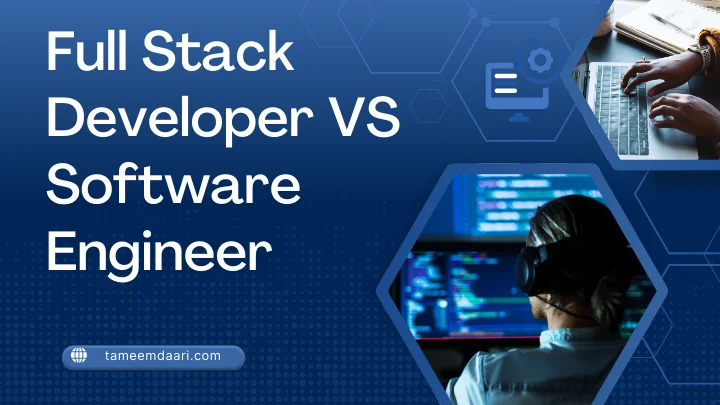full stack developer vs software engineer. Both Full Stack Developers and Software Engineers play crucial roles in the tech industry, but their skill sets, focus areas, and responsibilities often differ. Understanding the distinctions between the two roles can help clarify career paths, hiring decisions, and team structures. Let’s break down the key differences:
Focus and Scope of Work
- Full Stack Developer: A full stack developer is responsible for developing both the front-end and back-end of a web application or software. This means they handle everything from designing the user interface (UI) to managing databases and server-side functionality. They are versatile and can work across the entire stack of technologies used in web development.
- Key Responsibilities:
- Front-end development (HTML, CSS, JavaScript, React, Angular, etc.)
- Back-end development (Node.js, Python, Ruby, Java, PHP, etc.)
- Database management (MySQL, PostgreSQL, MongoDB)
- API integration (REST, GraphQL)
- Server management and deployment (AWS, Docker, Kubernetes)
- Key Responsibilities:
- Software Engineer: A software engineer, on the other hand, typically focuses on designing, building, testing, and maintaining software systems or applications. Their scope is broader and may extend beyond web applications, including desktop applications, mobile apps, system software, and more. Software engineers can specialize in different areas, such as back-end development, systems architecture, or embedded systems.
- Key Responsibilities:
- Writing clean, scalable, and efficient code
- Problem-solving and debugging complex issues
- Software testing and quality assurance
- Collaboration with other engineers, designers, and stakeholders
- Ensuring performance, security, and reliability of the software
- Key Responsibilities:
Skill Set
- Full Stack Developer:
- Proficient in both front-end and back-end technologies.
- Knowledge of web frameworks (e.g., React, Angular, Vue.js for front-end; Express.js, Django, Ruby on Rails for back-end).
- Comfortable working with databases, server-side logic, and APIs.
- Familiar with DevOps tools for deployment and CI/CD pipelines.
- Software Engineer:
- Strong coding skills in one or more programming languages (e.g., Java, C++, Python, JavaScript, etc.).
- Expertise in software architecture and design patterns.
- Knowledge of algorithms, data structures, and system design.
- Focus on writing robust, maintainable code and solving complex computational problems.
Project Lifecycle
- Full Stack Developer: A full stack developer is often involved in the entire development process, from ideation and design to deployment and maintenance. They work closely with product teams to ensure that both the user-facing and backend components of an application work seamlessly.
- Software Engineer: While a software engineer may also work across the project lifecycle, they are generally more focused on specific stages, such as the design, development, and testing of the software. They may be specialized in certain parts of the system (e.g., algorithms, back-end logic, or software testing).
Breadth vs. Depth
- Full Stack Developer: The focus is on breadth, meaning full stack developers have a wide range of knowledge but may not specialize deeply in any one area. They are expected to handle a variety of tasks across both the front-end and back-end.
- Software Engineer: Software engineers often focus on depth, specializing in a particular area of software development (e.g., algorithms, data structures, system architecture). They may not need to know as much about front-end development or deployment tools but are expected to be highly skilled in their specific domain.
Collaboration with Other Teams
- Full Stack Developer: Full stack developers often collaborate with UI/UX designers, product managers, and back-end developers. They bridge the gap between design and implementation, ensuring the front-end and back-end work together seamlessly.
- Software Engineer: Software engineers may work closely with other engineers, project managers, and QA teams, but their role is often more focused on specific software development tasks rather than the full project lifecycle.
Job Titles and Specializations
- Full Stack Developer: The job title is specific to the role of developing across the full web stack. Full stack developers may be called upon for tasks ranging from front-end coding to setting up databases and APIs. Specializations include:
- Web Developer
- Front-end Developer
- Back-end Developer (though this is often considered a separate role)
- Software Engineer: The job title is broader and can refer to many different specializations in software development, such as:
- Back-end Engineer
- Front-end Engineer
- Systems Engineer
- DevOps Engineer
- Embedded Software Engineer
Educational Background
- Full Stack Developer: Full stack developers often come from diverse backgrounds, ranging from self-taught developers to those with degrees in computer science or software engineering. Many have gone through coding boot camps or web development courses that focus on the full stack.
- Software Engineer: Software engineers usually have a degree in computer science, software engineering, or a related field. They often have a strong foundation in algorithms, data structures, and system design, with a focus on computational theory.
Conclusion
- Full Stack Developers are jack-of-all-trades who work across both the front-end and back-end of web applications, focusing on creating functional, end-to-end solutions for projects. They need a broad skill set that spans multiple technologies but may not specialize in any one area.
- Software Engineers tend to have a deeper focus on specific areas of software development, such as back-end systems, algorithms, or large-scale software architecture. They write complex, efficient code and solve intricate technical problems.
